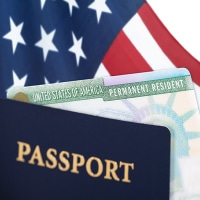The Pathway to U.S. Citizenship
For an adult immigrant to become a U.S. citizen, you must go through the process of naturalization. The most common paths to U.S. citizenship through naturalization call for the immigrant to meet the following criteria…
U.S. Citizenship Eligibility Requirements…
Eligibility Requirements
If you are a Green Card holder of at least 5 years, you must meet the following requirements in order to apply for naturalization:
- Be 18 years of age or older at the time of filing
- Be a permanent resident Green Card holder for at least 5 years
- Have lived within the state, or USCIS district with jurisdiction over the applicant’s place of residence, for at least 3 months prior to the date of filing the application. Students may apply for naturalization either where they go to school or where their family lives.
- Have continuous residence in the United States as a Green Card holder for at least 5 years immediately preceding the date of filing the application
- Be physically present in the United States for at least 30 months out of the 5 years immediately preceding the date of filing the application
- Reside continuously within the United States from the date of application for naturalization up to the time of naturalization
- Be able to read, write, and speak English and have knowledge and an understanding of U.S. history and government (civics).
- Be a person of good moral character, attached to the principles of the Constitution of the United States, and well disposed to the good order and happiness of the United States during all relevant periods under the law
Eligibility Requirements
To be eligible for naturalization through marriage, an applicant must:
- Be 18 years of age or older
- Be a permanent resident Green Card holder for at least 3 years
- Have been living in marital union with the same U.S. citizen spouse during the 3 years immediately preceding the date of filing the application
- Have lived within the United States for at least 3 months prior to the date of filing the application
- Have continuous residence in the United States as a lawful permanent resident for at least 3 years immediately preceding the date of application
- Reside continuously within the United States from the date of application for naturalization until the time of naturalization
- Be physically present in the United States for at least 18 months out of the 3 years immediately preceding the date of filing the application
- Be able to read, write, and speak English and have knowledge and an understanding of U.S. history and government
- Be a person of good moral character, attached to the principles of the Constitution of the United States, and well disposed to the good order and happiness of the United States during all relevant periods under the law
Eligibility Requirements
There are two general ways to obtain citizenship through U.S. citizen parents: at birth, and after birth but before the age of 18. Congress has enacted laws that determine how citizenship is conveyed by a U.S. citizen parent or parents to children born outside of the United States.
Who May Qualify for Acquisition of Citizenship
The law in effect at the time of birth determines whether someone born outside the United States to a U.S. citizen parent or parents is a U.S. citizen at birth. In general, these laws require that at least one parent was a U.S. citizen, and the U.S. citizen parent had lived in the United States for a period of time. In addition, children born abroad may become U.S. citizens after birth.
Definition of Child
In general, a child for citizenship and naturalization provisions is an unmarried person who is:
- The genetic, legitimated, or adopted son or daughter of a U.S. citizen; or
- The son or daughter of a non-genetic gestational U.S. citizen mother who is recognized by the relevant jurisdiction as the child’s legal parent.
Children of U.S. Citizens Residing in the United States
Children who were born outside the U.S. but now live in the U.S. may acquire citizenship. A child born outside of the United States automatically becomes a U.S. citizen when all of the following conditions have been met:
- The child has at least one parent, including an adoptive parent, who is a U.S. citizen by birth or through naturalization;
- The child is under 18 years of age;
- The child is a lawful permanent resident; and
- The child is residing in the United States in the legal and physical custody of the U.S. citizen parent.
Children of U.S. Citizens Residing Outside the United States
Children residing outside of the United States may obtain citizenship. A child who regularly resides outside of the United States is eligible for naturalization if all of the following conditions have been met:
- The child has at least one parent, including an adoptive parent, who is a U.S. citizen by birth or through naturalization;
- The child’s U.S. citizen parent or U.S. citizen grandparent meets certain physical presence requirements in the United States or an outlying possession;
- The child is under 18 years of age;
- The child is residing outside of the United States in the legal and physical custody of the U.S. citizen parent, or of a person who does not object to the application if the U.S. citizen parent is deceased; and
- The child is lawfully admitted, physically present, and maintaining a lawful status in the United States at the time the application is approved and the time of naturalization.
Naturalization Through Military Service
If you are serving or have served in the U.S. armed forces and are interested in becoming a U.S. citizen, you may be eligible to apply for naturalization under special provisions of the Immigration and Nationality Act. As a member or veteran of the U.S. military, certain other naturalization requirements may not apply to you; for example, if you are currently active duty you may not have to reside in or be physically present in the U.S. for any length of time before you apply for naturalization. The requirements for naturalization are explained in greater detail below.
One Year of Military Service During Peacetime
If you served honorably in the U.S. armed forces for at least one year during a period of peacetime, you may be eligible to apply for naturalization. To establish eligibility, you must:
- Have served honorably, during a period of peacetime, in the U.S. armed forces for a period or periods totaling one year;
- Have submitted a completed Request for Certification of Military or Naval Service, at the time of filing the N-400 to demonstrate honorable service;
- Be a lawful permanent resident at the time of your naturalization interview;
- Meet certain residence and physical presence requirements;
- Demonstrate the ability to read, write, and speak English;
- Demonstrate knowledge of U.S. history and government;
- Demonstrate good moral character for at least five years before filing your N-400 through the day you naturalize; and
- Demonstrate an attachment to the principles of the U.S. Constitution.





